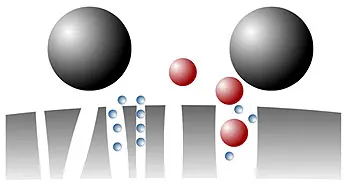- 3% Discount on online orders
- Fast Delivery Times
- DIN ISO 9001:2015 Certified
- Manufacturer Expertise
- Contact Us
Checkout using your account
Checkout as a new customer
Creating an account has many benefits:
- See order and shipping status
- Track order history
- Check out faster
Aqueous Size Exclusion Chromatography GFC/SEC
Aqueous gel filtration chromatography or size exclusion chromatography (GFC or SEC) is an analytical separation method for characterising macromolecular substances in aqueous media. SEC is based on the principle of molecular sieving, whereby the separation of the analytes is based exclusively on physical size differences and not on chemical interactions with the stationary phase. This characteristic predestines SEC for use in biochemistry, polymer chemistry and other research fields that require precise analysis of molecular sizes, molecular mass distributions and conformations.
Read the theoretical basics of aqueous gel filtration chromatography on our website and find a selection of SEC products from renowned manufacturers. You will also find brochures, catalogues and applications for proteins, polysaccharides, nucleic acids and synthetic polymers using SEC chromatography columns.

Further categories of Size Exclusion Chromatography:
Products
Technical Data
Basics
Stationary phases in GFC/SEC
The stationary phases in gel filtration chromatography are either porous silica or polymer-based materials such as polyhydroxymethacrylate or polyvinyl alcohol. In order to reduce adsorption or other undesirable interactions of the analytes with the silica materials, these are usually functionalised with diol groups or undergo special treatment during the manufacturing process. Silica phases are used as stationary phases, especially for proteins, antibodies and enzymes, as they have a high resolution and recovery rate. Polymer-based materials are increasingly being used for other polar polymers such as polyethylene glycol.
Mobile phases of the GFC/SEC
Water is mainly used as the mobile phase for gel filtration chromatography (GFC). GFC is used as a bioseparation technique for the separation of proteins and other large biomolecules and therefore the use of buffers or salts can be helpful. In addition to aqueous eluents, mixtures of water and organic solvents such as acetonitrile and methanol can also be used in some cases.
Detectors of the GFC/SEC
Basically, the same detectors can be used for gel filtration chromatography as in HPLC. UV and RI detectors are used particularly frequently. In addition, light scattering and viscosity detectors are also used for polymer analysis in order to obtain specific molecular and structural information about the analyte. When SEC is combined with light scattering, viscometers and concentration detectors (known as triple detection), it can calculate absolute molecular weight, molecular size and intrinsic viscosity, as well as provide information on macromolecular structure, conformation, aggregation and branching. To obtain absolute molecular weights of a sample, the Multi Angle Light Scattering Detector (MALS) can be used. This detector works in a similar way to the simple light scattering detector.
Reference materials for GFC/SEC
By using reference materials with known molecular size and molecular mass distribution, the GFC system can be calibrated to allow precise analysis of molecular weights and molecular size distribution in a sample. Calibration standards are essential to regularly check the performance of the GFC system and ensure that results are consistent and reliable over time. These standards also help to optimise separation conditions and improve analytical accuracy, making them a critical component of high quality GFC analysis. MZ-Analysentechnhik GmbH offers you a wide range of different SEC reference materials from manufacturers such as Sigma Aldrich, Tosoh, Shodex or Waters.
Columns for the SEC/GPC
To select a suitable column, a few basic questions should be clarified first.
1. What is the polarity of the analyte and which solvents are suitable?
For polar biopolymers such as proteins, antibodies or enzymes, purely aqueous buffers are often used as eluents. Silica gel has proven to be a suitable base material for this. For polar to medium-polar polymers, aqueous or polar organic eluents or mixtures of both are used. The base material is often polymethacrylate or polyvinyl alcohol. For non-polar polymers in purely organic eluents, gel permeation chromatography is usually used with styrene-divinylbenzene copolymers (PS/DVB) as stationary phases.
2. What is the molecular weight of my analyte?
The molecular weight of the analyte or its size in the solvent determines the pore size of the stationary phase. The absolute pore sizes range from about 25 to 30,000 Å, which covers a molecular weight range of about 100 to > 20,000,000 Daltons. For samples with very different molecular weights, either several columns with different pore sizes can be connected in series or columns containing particles with different pore sizes can be used. These are often labelled "linear", "mixed gel" or "multipore gel".
In many cases, suitable pore sizes can be easily determined with the help of the usually very extensive calibration data provided by the manufacturers.
Columns for aqueous mobile phases (GFC) and aqueous/organic mobile phases
| Manufacturer | Column lines | Characteristics |
| Tosoh Bioscienace | Base material: silica gel | |
| Tosoh Bioscience | Base material: polymethacrylate | |
| Shodex™ | K-800 Series | Base material: Silica gel |
| Shodex™ | SB-800HQ Series | Base material: Polyhydroxymethacrylate |
| Shodex™ | LB-800 Series | Base material: Polyhydroxymethacrylate |
| Shodex™ | Base material: Polyvinyl alcohol | |
| Sepax™ | Base material: silica gel | |
| Sepax™ | Base material: silica gel | |
| Mitsubishi Chem. Corp.™ | Base material: Hydrophilic polymer | |
| Supelco | Base material: silica gel | |
| Waters™ | Base material: Polyhydroxymethacrylate |
The right column for you - we will be happy to support you individually
Competent consultants are always at your side. Write a message to our consultants, we will get back to you and give you individual support.